Tucked away between housing developments just west of where the Sacramento and American Rivers merge sits New Roots Farm. As joggers and dog walkers glance down from the nearby levee, 19 young adults haul compost on a sunny Saturday in late October. They wear matching gray T-shirts and khaki cargo pants. Gusts of wind from the north fling dirt and dust into their unwrinkled faces. A trio uses shovels to fill wheelbarrows with compost before teammates push them into the garden and dump the contents. From there, a dozen others wield steel rakes and shovels to spread the compost into rows between mulch, where lettuce and tomatoes will be planted. Empty wheelbarrows are returned to the waist-high compost pile to complete the cycle, and the process begins again. For some, this labor may seem too monotonous or strenuous. But for members of AmeriCorps National Civilian Community Corps, this is the work they signed up for.
The federal program recruits Americans ages 18-26 for a 10-month commitment to national service. Members of NCCC are assigned to one of four campuses across the country. The Pacific Region campus, located on McClellan Air Force Base in Sacramento’s North Highlands, receives a new class of corps members every October. Teams often include 18-year-olds just out of high school, recent college graduates and young professionals in their mid-20s. The program attracts city dwellers, rural residents and suburbanites from a variety of socioeconomic backgrounds. The program’s multiracial makeup reflects the country’s diversity, and its intense living conditions force members to unlearn their preconceived notions, often leading to lifelong friendships with people they may never have known otherwise.
Today, AmeriCorps is one of the few institutions with continued
bipartisan support. Earlier this year, 29 senators co-sponsored a
bill that would recognize alumni for their national service.
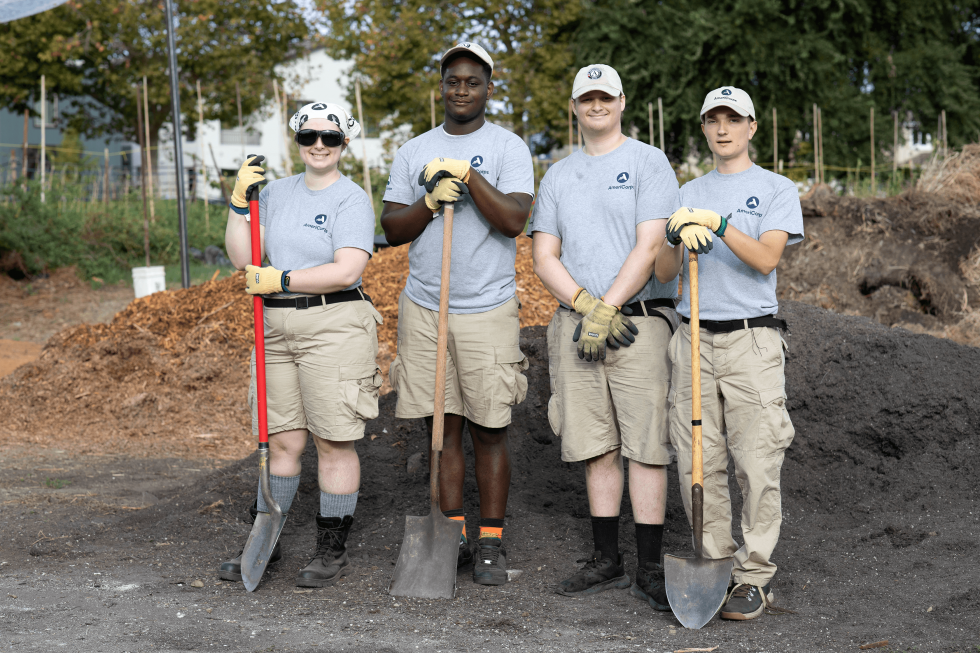
This month marks the 30th anniversary of NCCC’s conception. Inspired by the New Deal’s Civilian Conservation Corps, the program was designed by Senate Democrats and Republicans in collaboration with the George H.W. Bush administration. Their goal was to repurpose military resources from the Cold War to address the nation’s challenges. Ten months later, President Bill Clinton signed NCCC — and the rest of AmeriCorps — into law as part of the Defense Authorization Act of 1993.
Today, AmeriCorps is one of the few institutions with continued bipartisan support. In March, 29 senators co-sponsored a bill that would recognize alumni for their national service. The program partners with nonprofits throughout the country on a variety of projects, including urban and rural development, disaster relief, infrastructure improvement, and environmental stewardship and conservation. Such a broad focus area means each NCCC team has a very different AmeriCorps experience.
For Rita Bardon and her team, that meant working in a hospital in Boise, Idaho, before moving to San Diego, where they partnered with the Internal Revenue Service’s Volunteer Income Tax Assistance to help low-income residents file their taxes. Their final project brought them to Republic, Wash., where they worked eight- to 10-hour days performing trail maintenance with the U.S. Forest Service before graduating from AmeriCorps in July. Each project typically lasts about three months.
Bardon faced the added challenge of serving as team leader, a
role given to applicants who’ve demonstrated leadership in
school, jobs or community. Managing her team’s expectations — as
well as her own — was the hardest part. “You read about things on
the internet about what this program might be or you see people’s
videos on YouTube … but once you’re in it, it’s just totally
different than what your expectations were,” she says.
When she learned her first project would be providing COVID-19
relief, she never thought she’d be working in a hospital kitchen.
And while a winter in San Diego seemed appealing, no one on her
team expected to be spending their days in an office completing
W-2 forms while living in tents for three months. Some had never
even been camping before.
Adapting to life in AmeriCorps
Forcing people out of their comfort zone is one of NCCC’s goals. It’s why most members are deployed to another region instead of being assigned to the closest campus. Living far from home can be a struggle for some members. Taylor Perez, a 19-year-old from Nanjemoy, Maryland, says homesickness has been his biggest challenge since he and 121 fellow corps members arrived in Sacramento last month to begin their service term. Perez says the time zone difference makes it difficult to keep in touch with family, but weekly phone calls and frequent texts keeps him connected with his parents. “My family sends me pictures of my cat that I like to look at,” he says. “She’s fat. And she’s nice.”
Acclimating to a daily schedule rooted in military efficiency can also be difficult. Garrett McPherson, a 20-year-old from Little Rock, Arkansas, is still getting used to early-morning fitness training. Last month, his team was up at 5:15 a.m. for a pre-dawn walk. For teammate Kirklen Taylor, 22, the biggest adjustment has been to his diet. “Before I came here I was eating anything I wanted, gaining all this weight,” the Enid, Oklahoma, native says. “And now I’m eating healthy and working out every day.”
NCCC members live in close quarters with 10 coworkers for a year,
testing their comfort zones and encouraging opportunities for
growth.
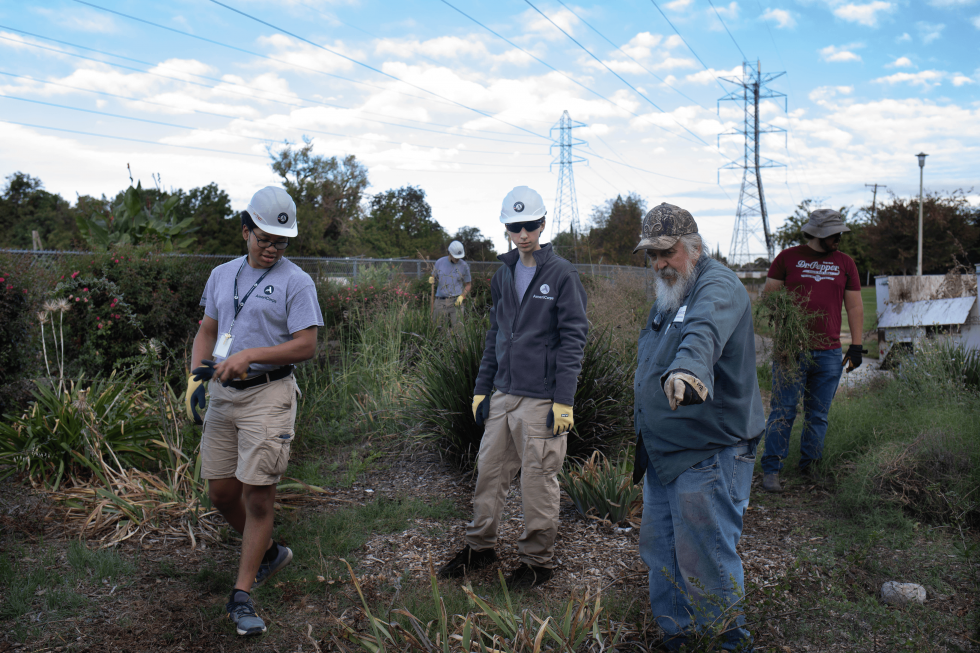
Of course, living in close quarters with 10 coworkers for a year is also bound to test one’s comfort levels. Imagine a season of MTV’s “Real World,” then add six months, take away the plush house, and assign 40-plus hours a week of physically demanding labor in all types of weather. That’s NCCC in a nutshell.
But Gray Weaver, a 19-year-old from Vicksburg, Mississippi, also sees the challenge as an opportunity for growth. “Back home, I’d interact with the same few people a lot, so just stepping out of my comfort zone, interacting with a lot of new people has been the biggest challenge.”
Life after AmeriCorps
Many alumni credit their time in NCCC for shaping them into who they are today, proving the AmeriCorps pledge — which includes committing to service “this year and beyond” — has merit. Robyn Purchia graduated in 2003 as a team leader in the Pacific Region’s Class IX, and now works as an attorney with the California Public Utilities Commission. “AmeriCorps challenged me to think of service less as a hobby and more as a lifestyle,” she says. “That can mean keeping an open mind, being brave enough to speak up, or not walking away from problems.”
Kris Carter was also a Class IX member. He graduated college with an engineering degree and several job offers in 2002, but instead opted to join AmeriCorps. That decision steered him toward a career in youth development before transitioning to a public servant role in Boston’s city government, where he’s worked for more than a decade. “I can trace those career decisions back to NCCC,” he says. “Yes, I found lifelong friends that year, but I also found a piece of myself and my core values.”
RoShawn Perry served as a team leader in Class XV. More than a decade after serving, he’s still working to strengthen the Sacramento community, now as executive director at Daughters of Zion Enterpryz. The nonprofit supports local residents who’ve experienced homelessness or abuse, and helps them get back into the workforce. The organization also provides tutoring and mentoring to area teens. Perry credits his NCCC experience for shaping who he is today. “It helped me become more confident as a leader,” he says. “It gave me the skill set I needed to effectively do the work I’m doing today.”
NCCC leaves its mark on Sacramento
While NCCC has a lifelong impact on its alumni, the program also has a lasting effect on Sacramento. Despite graduating in 2009, Perry’s partnership with NCCC continues. Daughters of Zion Enterpryz has hosted corps members for more than a decade for independent-service projects, and hosted its first team earlier this year after receiving an AmeriCorps grant for a six-week project. The NCCC members’ commitment to DOZ’s mission did not go unnoticed. “They really had a deep perspective about giving back to the community, and that was everything to them,” DOZ Resource Coordinator Deborah Watkins says.
Sacramento’s NCCC teams have planted trees in local parks,
performed trail maintenance on bike trails, and tended to several
of Sacramento’s 19 community gardens.
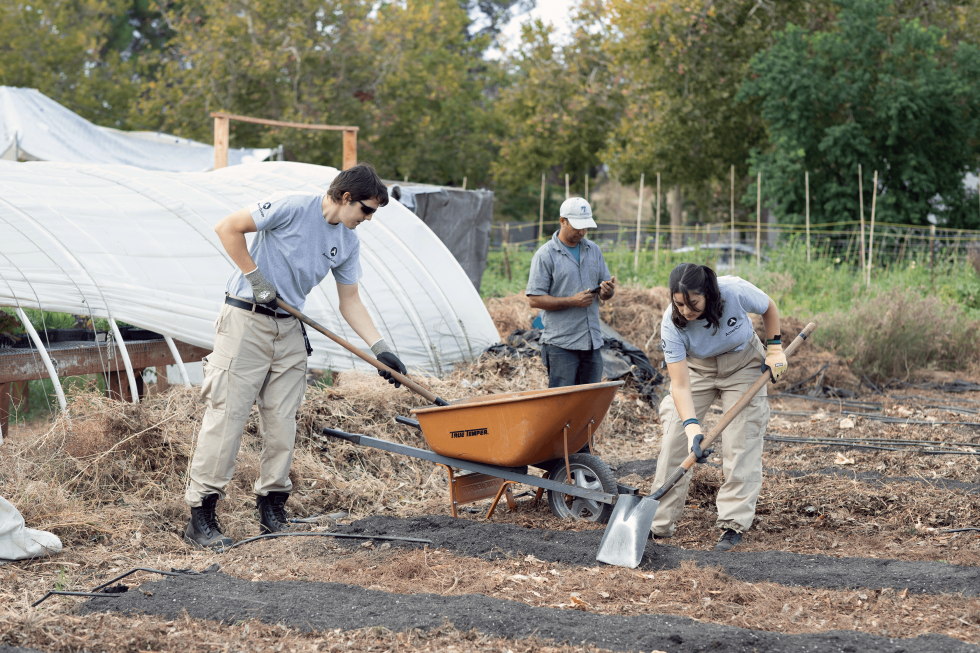
Perry describes NCCC as a “force multiplier” that improved DOZ’s efficiency, while also reducing his staff’s workload. Team members performed a variety of tasks for the organization, including assembling boxes of dried goods for locals, and canvassing the area to inform residents of DOZ’s free food distribution service. “You’re able to reach more people and support the community in a better way,” he says.
Perhaps no one understands this force multiplication better than Bill Maynard. The city’s community garden coordinator has worked with AmeriCorps teams ever since the NCCC campus relocated from San Diego in 2000. In that time, he’s seen teams plant trees in local parks, perform trail maintenance on bike trails, and tend to several of Sacramento’s 19 community gardens. Most recently, he supervised a weeding project at Ninos Community Garden on October 22. He says the 20 corps members and team leaders were able to accomplish in one day what would have taken him and his colleague two weeks. Maynard’s 22-year partnership with NCCC has enabled the baby boomer to work with three generations of corps members, from Gen X to millennials to Gen Z. Aside from their gray and khaki uniforms, he’s also noticed another commonality: hard work. “They’re a great bunch of young adults … trying to figure out what they want to do after college or maybe before college,” he says. “But they’re courteous, hardworking, very polite and they get the job done, so it’s really fun working with them.”
Back at New Roots Farm, corps members break for lunch under a small shade structure as Ram Khatiwoda admires their work. As farm coordinator for the International Rescue Committee, he works to ensure that refugees and political asylees have a place to grow and sell what he calls “their culturally appropriate” food. But the garden offers much more than sustenance to its members, many of whom arrived in Sacramento after fleeing violence or persecution in their home countries. “Coming to the garden means claiming their past life,” Khatiwoda says. “They can talk with nature, walk in nature … and have the time spent peacefully.”
New Roots Farm currently serves refugees from 10 different countries, including Nepal, Afghanistan and Iraq. Khatiwoda says this global representation gives the farm a cross-cultural element. He points out gardens also provide a sense of community to IRC’s diverse group of clients. It’s a fitting link to NCCC’s pledge to bring people “together to strengthen our communities” and “make our people safer, smarter, and healthier.” For Carter, the pledge still holds meaning two decades after his first year of service. “I often reflect upon … the values we were supposed to be upholding, which concluded with ‘I will carry this commitment with me this year and beyond,’” he says. “Twenty years later, I’m still carrying that commitment to take action, seek common ground and strengthen communities.”
–
Get all our web exclusives in your mailbox every week: Sign up for the Comstock’s newsletter today!
Recommended For You
Sponsored
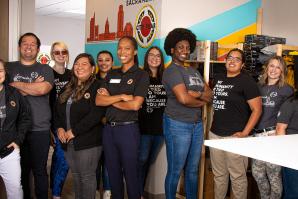
Building Toward a Diverse, Inclusive and Equitable Culture by Supporting Students
City Year
The lack of access to learning opportunities and resources in our communities has become more apparent as our economy continues to experience uncertainty. Unfortunately, these issues have been long-standing, but organizations like SchoolsFirst FCU are taking an active role in improving access to educational programs. An example of this is SchoolsFirst FCU’s grant recipient, City Year.
Sponsored
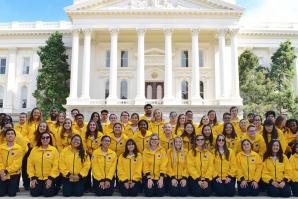
10 Years Supporting Sacramento Students
City Year
Launched locally in the 2011/2012 school year, City Year is celebrating 10 years in Sacramento with a commitment to improving educational equity and academic and social-emotional development for students through proven methods and tutoring with AmeriCorps student success coaches.

On the Fast Track: Kevin McAllister
Meet 13 young professionals who are on the fast track, bringing new ideas and innovations to the Capital Region
Before most people had fully realized the gravity of COVID-19,
Kevin McAllister, executive director of Meals on Wheels, was
already stocking up on supplies for the program. His preparedness
paid off.

The Learned Philanthropist
Academic programs for philanthropists and nonprofit leaders are emerging nationwide
After two decades of working in the nonprofit industry, Robin Chronister, an executive assistant for Mother Lode Rehabilitation in Placerville, noticed a gradual but clear change in the nonprofit sector.

On the Rise: Melissa Granville
Meet 12 young professionals who are shaping their industries and the Capital Region
Melissa Granville, principal at Capitol Impact, has pointed all her professional efforts toward making a positive social impact in her community.

Command and Deliver
Sacramento's young professionals are gaining influence
No agency is safe. No office off limits. Boardrooms will be infiltrated. Communication barriers will crumble for the sake of collaboration. As the old guard inches toward that horizon called retirement, Sacramento’s young power players are taking center stage.



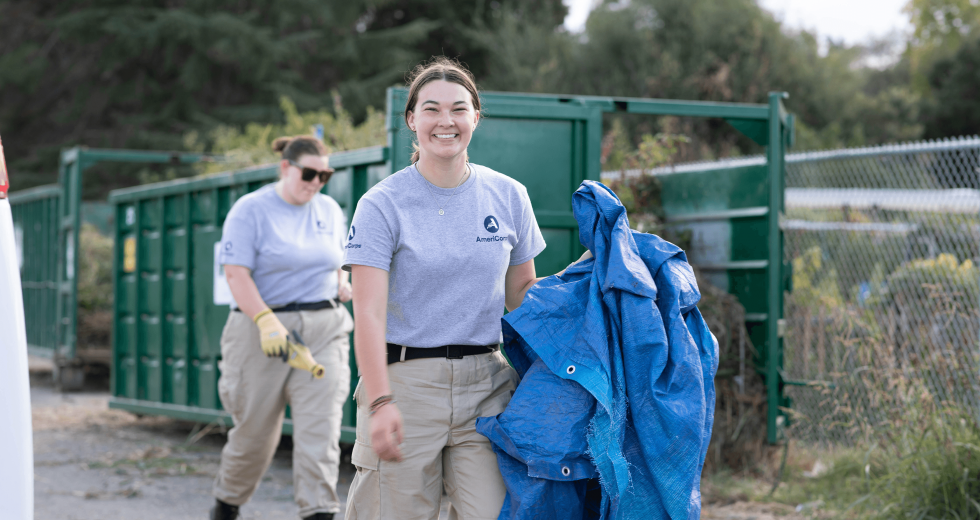
Comments
Thank you for highlighting AmeriCorps NCCC and these young people's desire to serve their country. This was a well-written and informative article.